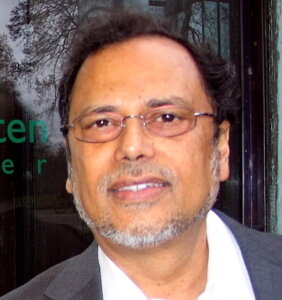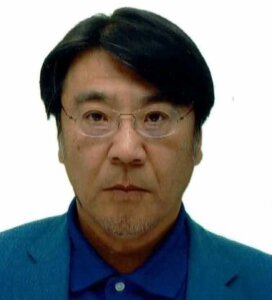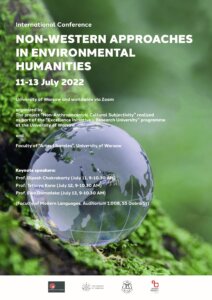Non-Western Approaches in Environmental Humanities
About the Conference
International Conference
Non-Western Approaches in Environmental Humanities
11–13 July 2022
University of Warsaw and worldwide via Zoom
The main aim of the conference (which is correlated with the topics of the project “Non-anthropo- centric Cultural Subjectivity” realized as part of the “Excellence Initiative – Research University” pro- gramme at the University of Warsaw) is to reflect on theoretical frameworks in environmental hu- manities which have emerged as alternative or complementary to western approaches. We would like to support theoretical reflections concerning the relationship between human beings and the environ- ment that have been developed in non-western cultural contexts. By helping to determine the prob- lems crucial for “non-western” environmental humanities, the conference will also be a starting point for further cooperation and research.
We understand the adjective “non-western” in two ways. In one general sense, the term simply implies alternatives to the mainstream theoretical frameworks deriving especially from North America and Western Europe. “Non-western” in this sense includes the trends and theoretical conceptions devel- oped by researchers representing different geographical and historical locations as well as different cultural traditions, for example the Global South, indigenous and non-white cultures. A narrower un- derstanding of “non-western” suggests research perspectives applied on local scales. Therefore, one of the conference’s main aims is to concentrate on the Eastern European context. This focus entails the presentation of research concerning the environmental history of Eastern Europe as well as at- tempting to work out research frameworks reflecting the local, Eastern European perspectives on the relationship between human beings and their environments.
The conference draws on already existing debates in the field of environmental and postcolonial stud- ies, but will also open up new debates on relations between humans and the non-human environment which challenge the dominant Western perspective. We are open to stimulating case studies from Eastern Europe and the Global South. However, presentations focusing primarily on developing novel theoretical frameworks are especially welcome.
Our Keynote Speakers

© Dipesh Chakrabarty
Dipesh Chakrabarty is the Lawrence A. Kimpton Distinguished Service Professor of History, South Asian Languages and Civilizations at the University of Chicago. He is the author of The Climate of History in a Planetary Age (2021), Some Aspects of Labour History of Bengal in the Nineteenth Century: Two Views (with Ranajit Dasgupta, 2018), and The Crises of Civilization: Exploring Global and Planetary Histories (2018).
Keynote lecture: If trees and rivers have standing, what do we do with microbes?, 11 July 2022, 9 AM CET. Location: Faculty of Modern Languages, Dobra 55 St., Auditorium 1.008. To watch click here.

© Tetsuya Kono
Tetsuya Kono received his Ph.D. in Philosophy from Keio University. His main research interests lie in phenomenology, philosophy of mind, and philosophical psychology. He has also been conducting collaborative research on the education for children/persons with disability from the phenomenological perspective. He is also concerned in environmental philosophy and environmental ethics. He is teaching philosophy of education, moral education, special need education in the department of education of Rikkyo University.
Keynote lecture: Phenomenology of radioactivity: 11 years after Fukushima, 12 July 2022, 9 AM CET. Location: Faculty of Modern Languages, Dobra 55 St., Auditorium 1.008. To watch click here.

© Ewa Domańska
Ewa Domańska is professor of human sciences at the Faculty of History, Adam Mickiewicz University, Poznań. Since 2002, visiting professor at the Department of Anthropology/Archeology Center/DLCL, Stanford University (Spring term). Her scientific work focuses on the methodology of history, contemporary theory and history of historiography, comparative theory of the humanities and social sciences, new trends in the humanities as well as the environmental humanities, ecocide and genocide studies.
Keynote lecture: Environmental Knowledges: Indigenous and Western, 13 July 2022, 9 AM CET. Location: Faculty of Modern Languages, Dobra 55 St., Auditorium 1.008. To watch click here.

